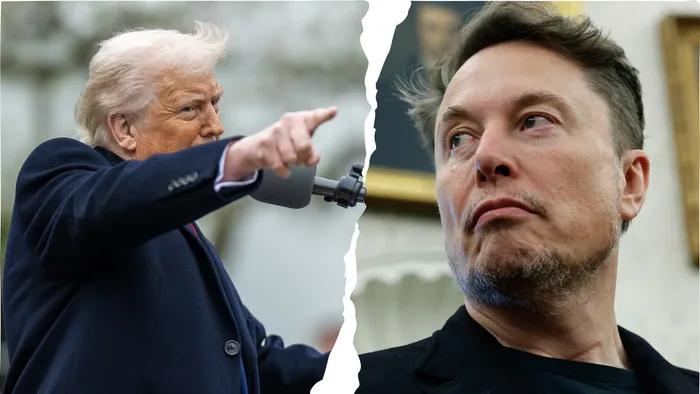Did Trump rush to close the Epstein case after Elon Musk's explosive accusation?

Following Elon Musk's claim linking Donald Trump to Jeffrey Epstein's client list, the DOJ's release of a memo and prison footage raises questions about the integrity of the investigation.
Image: Graphic/Se-Anne Rall
Just weeks after Elon Musk publicly claimed that Donald Trump was included in Jeffrey Epstein’s notorious “client list”, the Trump-era Department of Justice and FBI have released a memo and grainy prison footage that seeks to bury the case for good.
The timing has raised eyebrows, fuelling suspicions that this sudden “closure” is more of a strategic cover-up than a conclusive investigation.
Despite longstanding speculation about Epstein’s powerful connections, and the belief by many that he was silenced to protect public figures, authorities now insist there is no evidence of a client list, blackmail, or foul play in Epstein’s death.
But is this truly justice, or just another carefully orchestrated coverup?
A convenient conclusion
The FBI, under Trump’s administration, has claimed there is no evidence Jeffrey Epstein was murdered, maintained no list of clients, or ever blackmailed high-profile individuals.
These findings were detailed in a two-page memo obtained by Axios Media, a private US-based outlet. This follows mounting social media pressure and Musk’s claim that Trump was implicated in Epstein’s files - which he later deleted.
In support of its conclusion, the DOJ released a video, both raw and “enhanced” taken from a common area in the Metropolitan Correctional Center in Manhattan, where Epstein was held.
Curiously, the footage does not show the inside of Epstein’s cell, nor does it capture the precise moments surrounding his death. Instead, it shows inmates wandering about a shared area, offering little reassurance to sceptics.
Investigators claimed they used enhanced imaging techniques to clarify the footage. Yet, the absence of direct visual evidence from Epstein’s cell has only intensified public doubt.
Former conspiracy theorists are now silent
Ironically, some of Trump’s closest allies in the FBI, Kash Patel (now FBI Director) and Dan Bongino (now Deputy Director), were once vocal about their disbelief in Epstein’s alleged suicide.
Prior to their official appointments, both men - staunch MAGA supporters - fuelled speculation that Epstein was silenced to protect a network of powerful individuals.
Now, however, both have walked back those claims. Bongino recently told Fox News, “He killed himself... I’ve seen the whole file.”
Elon Musk’s accusation
The DOJ's conveniently timed closure comes shortly after Musk publicly stated that Trump’s name was on Epstein’s list.
Trump swiftly responded by sharing a statement from David Schoen, Epstein’s former lawyer and Trump’s impeachment attorney, who declared Trump had never been implicated in any crime. Musk later retracted his comments, suggesting he had “gone too far.”
Still, speculation lingers. Trump and Epstein were known to socialise in the 1990s, and Epstein is on record as having once called Trump his “closest friend”- a claim Trump has since denied.
No further disclosures
The memo concludes with a blanket refusal to release further Epstein-related documents. It claims this is to protect the identities of victims and innocent individuals, citing concerns over child pornography and wrongful allegations.
However, critics argue this sweeping justification is a convenient way to avoid deeper scrutiny.
The Epstein saga has never been short on secrecy, high-profile associations, and sudden U-turns.
This latest move by the Trump-aligned DOJ feels less like closure and more like calculated damage control. If there’s truly nothing to hide, why are so many questions still unanswered?
IOL News